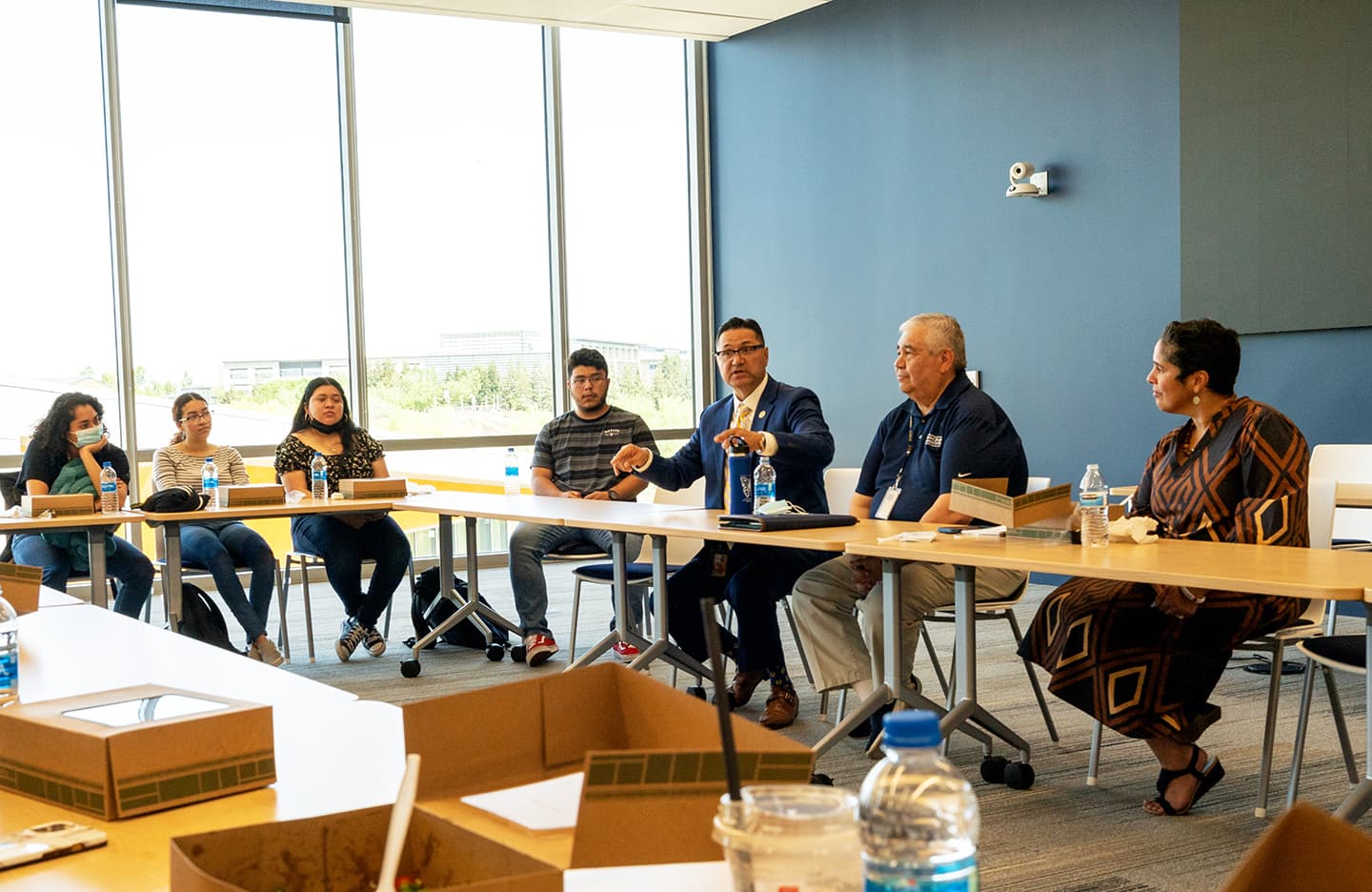New College Track President Shirley M. Collado Sees Herself in Her Students
Dr. Collado, a first-generation college graduate and daughter of immigrants, draws on her own experiences to steer the education nonprofit to deeper emphasis on equity, access, and upward mobility.
Photo: Jeffrey Foote Photography
In early April, Dr. Shirley M. Collado, the newly named president and CEO of College Track, sat down to lunch with about 20 of the college-completion program’s scholars who attend University of California, Merced. Since Collado started in January, she has been traveling to the five regions with established College Track centers—Northern California, Los Angeles, Colorado, New Orleans, and the D.C. metro area—to get to know the students and the staff.
The gathering at UC Merced was one of her first meet-and-greets with a college cohort.
One student spoke with heartfelt eloquence about her older brother, and how he prioritized her pursuit of a bachelor’s degree instead of his own: He worked to bring in money for their family while she studied.
Another described his persistence as an undocumented student, and the gravity of the tough choices he’d made to pursue his dream of a college education.
Though the students themselves weren’t familiar to Collado, their stories were.
Collado is a first-generation college graduate herself, and the daughter of immigrants from the Dominican Republic. Her father was a New York City cab driver, and her mother worked in a factory. Growing up, she’d never planned to go to a four-year college, much less leave New York City—her responsibility was at home, contributing to her family financially and helping raise her two younger brothers.
When she was 17, things changed. Collado was selected as one of five students from the NYC area to be part of the first cohort of an experimental college-access program administered by The Posse Foundation.
“In the fall of 1990, I boarded a Greyhound bus with the students in my cohort—and all of our mothers—and we took a 26-hour ride to Vanderbilt University, a place I had never seen outside of the admissions brochures mailed to my apartment,” Collado said. “Throughout my career, I’ve reflected on that ride, and the forces that determine who gets to be on the bus and who is left behind.”
Her understanding of the transformative power of equity and access has been at the heart of her work in higher education, as it is now with College Track. The organization, which was co-founded by Laurene Powell Jobs in 1997, started with 25 students from East Palo Alto. In 2002, the organization began to grow. Three centers—Oakland, San Francisco, and New Orleans—were established between 2002 and 2008. Then, beginning in 2011, a new center was added nearly every year until 2020: four more in California, two in Colorado, and the newest additions, two centers in the Washington, D.C. area.
Today, College Track comprises 12 sites that enroll nearly 4,000 students, primarily first-generation scholars of color from low-income households.
“It’s incredible to inherit an organization whose founder had the vision of seeing students for all of their promise, rather than what are commonly perceived as deficits,” Collado said. “Now, 25 years later, we understand that transformational things happen when you listen to students, when you stick to something for the long haul, and when you allow an idea to evolve.”
What sets College Track apart from its peers is a 10-year promise: A commitment to serve its scholars from high school, through college, and at the launch of their careers as they confront systemic barriers to pursue a life of opportunity, choice, and agency.
“The predominant perception of higher education is that it’s a normal next step after high school,” Collado said. “So many people don’t understand that for a large population of young people across the country, going to college is a political act, a radical act—a profound thing that cuts against the grain.”
Collado’s career bears this out. After graduating from Vanderbilt, she built a career in higher education, taking leadership roles at Rutgers University—Newark, Middlebury College, and Ithaca College, where she is president emerita and made history as the first Dominican in the country to lead a four-year institution.
So many people don’t understand that for a large population of young people across the country, going to college is a political act, a radical act.
The students Collado met with at UC Merced stand a good chance of following a similar path. Eighty-five percent of College Track scholars persist into their second year of college, and they graduate from college at a rate two-and-a-half times the national average of their first-generation peers. As alumni, 88% are employed or in graduate school, and 92% of employed alumni report earning enough to save money each month—a strong indicator of upward social mobility.
That link—between a bachelor’s degree and the unfurling of opportunity—has never been more important to reinforce, Collado thinks. “We are at a crucial moment in our nation’s history, when the structural inequities that prevent full participation in our society could not be more visible,” she said. Luckily for students like those she met at UC Merced and across the country—for students like her—she’s been working her whole career to identify and foster programs that can help.
“What’s needed now is exactly what College Track provides,” she said. “A bold, asset-based approach to education that affirms the authenticity and contributions of students from all walks of life.”
